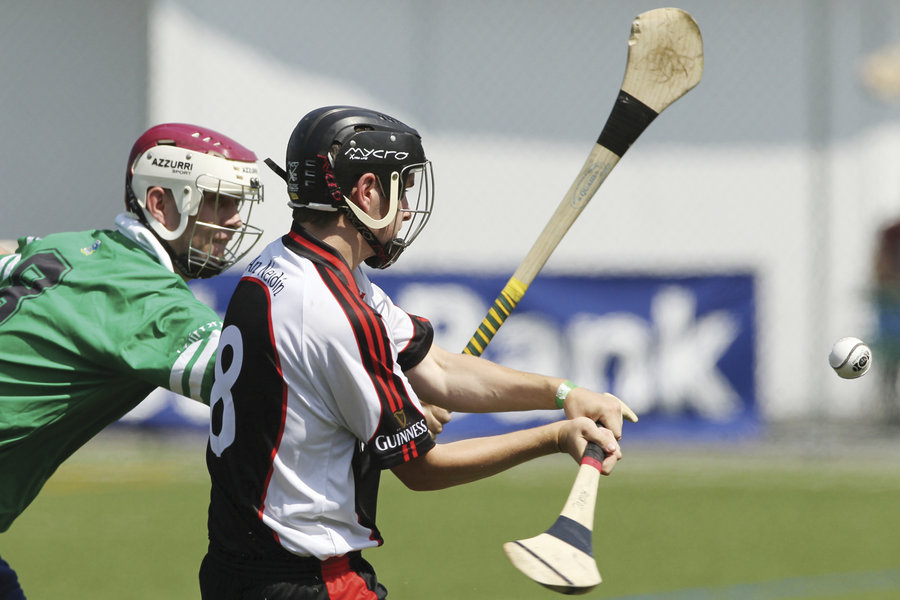If you were to ask 10 Hobokenites which sport was famously played here for the very first time, nine would tell you that, of course, it’s baseball. But if you put the same question to David Cosgrove, or one of the other 23 local members of the Hoboken Guards Hurling Club, you’d get a different answer.
In 1858, 30 Irishmen from Kenmare, County Kerry, Ireland, took a ferry across the river from New York City and played the first recorded game of hurling on American soil. It’s a blip on the radar compared to baseball, but hurling, a Gaelic sport dating back nearly 3,000 years, is today one of the most challenging sports on earth. Yet almost nobody in Hoboken knows about it, despite the city’s rich Irish heritage.
“It’s really a sport that represents the best of what it means to be Irish,” said Cosgrove, the president of Hoboken’s team, which has competed in the New York Gaelic Athletic Association since 2010. “In order to be good at it, you have to be skilled, smart, fit, and brave.”
The sport is an adrenaline rush to watch, let alone play. Teams are composed of 15 a side on a pitch about 30 percent bigger than a football field. The game is reminiscent of lacrosse, rugby, and hockey, and has historic ties to all those sports. Played with sticks called hurleys and a stitched ball known as a sliotar, it is thought to be the fastest-paced team sport. The objective—to score more goals than the opposing side—is simple, but it’s easier said than done.
Hurling was played in Hoboken throughout the 19th and 20th centuries, though the city didn’t have its own team until four years ago. Hobokenites along with other New Jerseyans typically formed teams and traveled to Gaelic Park in The Bronx to compete. This is where Cosgrove learned to play, traveling from his boyhood home in Edison up to Gaelic Park every weekend to watch his father, an Irish immigrant, play the game.
You don’t have to be Irish
Hoboken’s Irish community isn’t what it once was, but there’s still a dedicated hurling fan base that shows up at Mulligan’s Pub on First Street every Saturday to watch Irish league games on satellite. It was there in 2010 that Cosgrove floated the notion of forming an all-Hoboken side, an idea that was originally laughed off. But with persistence, and some help from Mayor Dawn Zimmer, the team officially formed and began practicing at Frank Sinatra Park.
Four years later, the team of about 40 (24 Hobokenites plus other Hudson County residents, not all of whom are of Irish descent) has competed in two of the biggest tournaments in the United States, sponsored by the New York Gaelic Athletic League—its North American parent league—and has vied for the top spot in both. It’s got a new home field, the recently opened 1600 Park in uptown Hoboken, and is looking to expand its ranks, beyond both the Hoboken and the Irish communities.
“I don’t like the perception that it’s closed to people who aren’t Irish,” said Cosgrove. “The sport itself is about unity, like any team sport, and so we’ll take anyone. The worst that could happen is that you get a great workout and make a few new friends.”
But when it comes to Hoboken’s Irish history, the city is at a crossroads: Older Irish residents often feel slighted politically as more young professionals move in. And in 2011, the city’s St. Patrick’s Day parade was cancelled indefinitely, replaced by what some say is a farce of a festivity known as LepreCon, arguably an excuse to get plastered without celebrating anything truly Irish.
In the Guards, Cosgrove said, Hobokenites have something to root for that celebrates the city’s Irish past without endangering its present.
“Playing hurling ticks all the boxes—you get to know your neighbors, you’re giving your town something it can be proud of, and you’re competing for something that Hoboken can celebrate,” he said. “But for fans, it could be even more special. Hurling isn’t the Holy Grail here, citizen participation in community events is.”—07030
